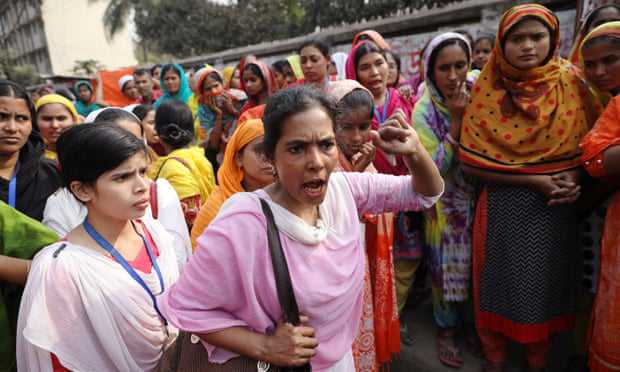Why are wages so low for garment workers in Bangladesh?

How can a charity-backed T-shirt come from a dismal factory where staff are abused and do gruelling work for low pay?
The Spice Girls and Comic Relief said they had checked the ethical sourcing credentials of Represent, the online retailer commissioned to make the T-shirts that have caused a furore, but it had subsequently changed manufacturer without their knowledge. Represent said it took “full responsibility” for problems identified by a Guardian investigation this week.
But it is little surprise that workers at the Bangladesh factory where the T-shirts were made were paid less than the local living wage.
Countries such as Bangladesh are popular places in which to operate because they offer cheap labour alongside expertise in clothing manufacture.
The legal minimum wage for garment workers in the country is 8,000 taka (£73.85) a month, slightly less than the amount received by workers spoken to by the Guardian.
The amount was increased by 2,700Tk a month in December, but campaigners say workers need 16,000Tk to live a comfortable life in Bangladesh. With such low wages, employees often feel compelled to take on large amounts of overtime to make ends meet.
Beyond wages, checking conditions in clothing supply chains requires considerable resources, covering a complex web of thread and fabric makers, dyeing services and stitching work, all located in distant, developing economies with poor communications infrastructure.
Local laws may regulate fire safety, pay and working conditions, but enforcement is often weak because there are not enough inspectors and there is significant potential for the corruption of officials. At the same time, workers can struggle to raise awareness of issues as a result of low levels of union recognition and fear of reprisals.
After the Rana Plaza clothing factory collapse in Bangladesh, in which more than 1,000 workers died, dozens of retailers and brands signed up to the accord on fire and building safety. It funded inspections and improvements to buildings, including fire doors and structural work, as well as helping inform workers of their rights and training managers to spot and respond to problems.
Mary Creagh, the chairwoman of the UK parliament’s environmental audit committee, which has carried out an investigation into sustainable fashion, previously said: “The best audit [of conditions] … is taken by workers through their elected representatives in your factories.” Globally, less than 10% of garment workers are in trade unions, she added.
But action to increase union representation in Bangladesh and other supplier countries has been slow, as union leaders and members can face intimidation because business owners and some governments see activists as a threat.
Where local regulation and union representation is weak, retailers have traditionally tried to weed out poor factories with regular inspections carried out by their own staff or professional ethical auditors.
Sedex, which has 50,000 members in more than 150 countries, enables brands to share data on ethical standards at thousands of factories around the world.
But Peter McAllister, the executive director of the Ethical Trading Initiative, which brings together businesses, unions and campaign groups to try to improve conditions in clothing manufacturing, said retailers and brands could not rely solely on inspection reports and those thatdid were “either naive or wilfully ignorant”.
The best retailers have teams on the ground who work closely with suppliers to monitor conditions and check details about the capacities of factories and the time needed to carry out particular work projects.
Such a detailed investigation can then identify when unrealistically low price points are being quoted – prices that can prompt factory owners to cut corners by forcing staff to do unpaid overtime or outsourcing work to less reputable establishments that may not have been inspected.
McAllister said price was one of the best indicators of working conditions: “If something is very cheap, you have to ask yourself, is it really possible to make it in a factory that is run properly, with a living wage?”
As 2019 begins…
… we’re asking readers to make a new year contribution in support of The Guardian’s independent journalism. More people are reading our independent, investigative reporting than ever but advertising revenues across the media are falling fast. And unlike many news organisations, we haven’t put up a paywall – we want to keep our reporting as open as we can. So you can see why we need to ask for your help.
The Guardian is editorially independent, meaning we set our own agenda. Our journalism is free from commercial bias and not influenced by billionaire owners, politicians or shareholders. No one edits our editor. No one steers our opinion. This is important as it enables us to give a voice to those less heard, challenge the powerful and hold them to account. It’s what makes us different to so many others in the media, at a time when factual, honest reporting is critical.
Please make a new year contribution today to help us deliver the independent journalism the world needs for 2019 and beyond
Source: https://www.theguardian.com
Tags :
Previous Story
- Cut from cloth, a nation
- Hunger for profits drives exploitation of females in...
- Unless addressed, wages issue will keep troubling Bangladesh’s...
- Bangladesh garment workers reject wage hike, walk off...
- A harbinger of change?
- Workers' wages rise in 6 grades
- Bangladesh police, garment workers clash in protests
- Liaquat Hossain Moghul appointed chairman of EU Trustee...